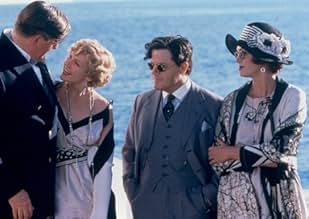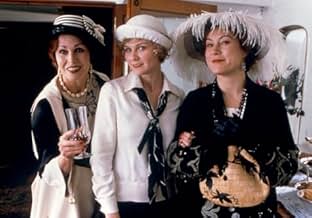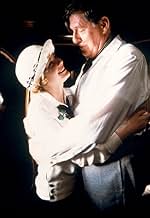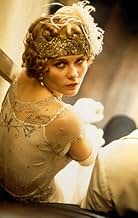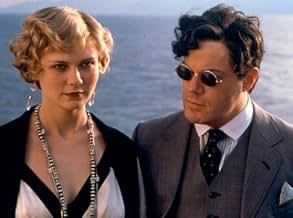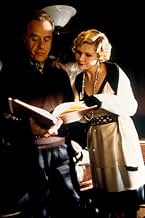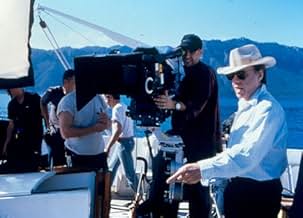IMDb रेटिंग
6.4/10
9.3 हज़ार
आपकी रेटिंग
अपनी भाषा में प्लॉट जोड़ेंSemi-true story of the Hollywood murder that occurred at a star-studded gathering aboard William Randolph Hearst's yacht in 1924.Semi-true story of the Hollywood murder that occurred at a star-studded gathering aboard William Randolph Hearst's yacht in 1924.Semi-true story of the Hollywood murder that occurred at a star-studded gathering aboard William Randolph Hearst's yacht in 1924.
- पुरस्कार
- 1 जीत और कुल 1 नामांकन
Zoe Mavroudi
- Servant
- (as Zoi Mavroudi)
Despina Mirou
- Servant
- (as Despina Morou)
फ़ीचर्ड समीक्षाएं
I have to say, I thought the Cat's Meow was the cat's pajamas. Peter Bogdanovich has made a story out of an event whose outcome is still unexplained. What's more, it feels like it actually could've happened. The interactions between the characters leading up to the act are given much more screen time than the actual act itself. So when it happens, it doesn't seem preposterous at all.
The story concerns newspaper honcho William Randolph Hearst (Edward Herrmann) and company celebrating the birthday of Hollywood producer Thomas Ince (Cary Elwes) on Hearst's yacht. That company includes Hearst's lover/actress Marion Davies (Kirsten Dunst), Charlie Chaplin (Eddie Izzard), author Elinor Glyn (Joanna Lumley), gossip columnist for Hearst's newspaper Louella Parsons (Jennifer Tilley), and Tom's lover. Tom hopes to negotiate a contract with W.R. Hearst for Marion to star in his next few films, but Hearst is more concerned about the attraction between Marion and Chaplin. Elinor is nearby to dispense advice, while Louella unsuccessfully attempts to mingle. There's also a pair of party girls on board attempting to have a raucous time as possible.
The Cat's Meow has an eclectic ensemble with a Robert Altman-esquire taste to it. Edward Herrmann's role may be the most challenging, because he has to juggle eccentric, warmth, and jealousy as W.R. Hearst. Joanna Lumley is wonderfully dry. And for those like me who only remember Eddie Izzard for his droll stand-up work, he's surprising in this film. He's quite good as Charlie Chaplin. Kirsten Dunst is the biggest name on the cast. She's very fetching in the Cat's Meow, and this represents a change of pace from her dearth of Hollywood-oriented films.
As good as the cast is, this is really just as much Peter Bogdanovich's film. After the excellent Last Picture Show, he sort of faded away and made smaller films (The Thing Called Love, for example). Although The Cat's Meow will not make him a household name, hopefully maybe his work will garner more attention again. His direction is very good here.
Oh, I should also mention the costume design and music here. The production values in general are excellent in imitating the feel of that era. I was reminded a little of Woody Allen's Bullets Over Broadway (and not just the Jennifer Tilly connection). Anyways, The Cat's Meow is a good movie with interesting characters and thoughtful direction.
The story concerns newspaper honcho William Randolph Hearst (Edward Herrmann) and company celebrating the birthday of Hollywood producer Thomas Ince (Cary Elwes) on Hearst's yacht. That company includes Hearst's lover/actress Marion Davies (Kirsten Dunst), Charlie Chaplin (Eddie Izzard), author Elinor Glyn (Joanna Lumley), gossip columnist for Hearst's newspaper Louella Parsons (Jennifer Tilley), and Tom's lover. Tom hopes to negotiate a contract with W.R. Hearst for Marion to star in his next few films, but Hearst is more concerned about the attraction between Marion and Chaplin. Elinor is nearby to dispense advice, while Louella unsuccessfully attempts to mingle. There's also a pair of party girls on board attempting to have a raucous time as possible.
The Cat's Meow has an eclectic ensemble with a Robert Altman-esquire taste to it. Edward Herrmann's role may be the most challenging, because he has to juggle eccentric, warmth, and jealousy as W.R. Hearst. Joanna Lumley is wonderfully dry. And for those like me who only remember Eddie Izzard for his droll stand-up work, he's surprising in this film. He's quite good as Charlie Chaplin. Kirsten Dunst is the biggest name on the cast. She's very fetching in the Cat's Meow, and this represents a change of pace from her dearth of Hollywood-oriented films.
As good as the cast is, this is really just as much Peter Bogdanovich's film. After the excellent Last Picture Show, he sort of faded away and made smaller films (The Thing Called Love, for example). Although The Cat's Meow will not make him a household name, hopefully maybe his work will garner more attention again. His direction is very good here.
Oh, I should also mention the costume design and music here. The production values in general are excellent in imitating the feel of that era. I was reminded a little of Woody Allen's Bullets Over Broadway (and not just the Jennifer Tilly connection). Anyways, The Cat's Meow is a good movie with interesting characters and thoughtful direction.
I am abhorred that the Oscars could ignore this film for all the categories it so well deserved:
Best Actress (Kirsten Dunst) Best Actor (Edward Herrmann) Best Costume Design Best Cinematography
And those are just the obvious ones!
Peter Bogdanovich is one of my favorite Directors. He has an amazingly vast Encyclopedia of knowledge about Hollywood during this time. He was good friends with the master Orsen Wells and even did the Commentary for Citizen Cane in Wells' place. He was unquestionably the perfect Director for putting this story to screen.
Kirsten Dunst is remarkable playing 24 year-old Marion Davies at only 18. She does a superb job in the role and deserved a lot more attention than she was awarded.
I strongly disagree with comments that the supporting cast was bad. Everybody was perfect for their role! The sax player WAS a sax player (not an actor) from Berlin (where most of the movie was filmed) and he did fantastic! (He only had one line for goodness sake!)
Though I would concur that Jennifer Tilly played Louella Parsons a bit unlike we would expect, I support her decision to treat her this way for the sake of this film. She lightened up the film with her bumbling silliness. So what if Lolly wasn't like that in real life? It worked well for the movie.
My only (slight) complaint was the decision to have one of the flappers briefly flash us (show her chest) during a party scene with her, the other flapper, the sax player and Chaplin. It was unnecessary and felt out of place with an otherwise clean movie. My guess is this was the reason for the PG-13 rating.
There is hardly any language - in fact Bogdanovich changed the film's only F-word to "screw" to clean it up even more than the original script. This works much better for the period than filling it with 21st century language.
Anybody interested in the 20's, William Randolph Hearst or 'The Golden Age of Hollywood' MUST see this movie!
8½ out of 10. (I can't decide between 8 and 9!)
Best Actress (Kirsten Dunst) Best Actor (Edward Herrmann) Best Costume Design Best Cinematography
And those are just the obvious ones!
Peter Bogdanovich is one of my favorite Directors. He has an amazingly vast Encyclopedia of knowledge about Hollywood during this time. He was good friends with the master Orsen Wells and even did the Commentary for Citizen Cane in Wells' place. He was unquestionably the perfect Director for putting this story to screen.
Kirsten Dunst is remarkable playing 24 year-old Marion Davies at only 18. She does a superb job in the role and deserved a lot more attention than she was awarded.
I strongly disagree with comments that the supporting cast was bad. Everybody was perfect for their role! The sax player WAS a sax player (not an actor) from Berlin (where most of the movie was filmed) and he did fantastic! (He only had one line for goodness sake!)
Though I would concur that Jennifer Tilly played Louella Parsons a bit unlike we would expect, I support her decision to treat her this way for the sake of this film. She lightened up the film with her bumbling silliness. So what if Lolly wasn't like that in real life? It worked well for the movie.
My only (slight) complaint was the decision to have one of the flappers briefly flash us (show her chest) during a party scene with her, the other flapper, the sax player and Chaplin. It was unnecessary and felt out of place with an otherwise clean movie. My guess is this was the reason for the PG-13 rating.
There is hardly any language - in fact Bogdanovich changed the film's only F-word to "screw" to clean it up even more than the original script. This works much better for the period than filling it with 21st century language.
Anybody interested in the 20's, William Randolph Hearst or 'The Golden Age of Hollywood' MUST see this movie!
8½ out of 10. (I can't decide between 8 and 9!)
The Cat's Meow is a semi-true story of a murder that occurred on William Randolph Hearst's yacht one evening in 1924. While much of the screenplay is presumably speculation, it is interesting to see the effects the murder on some of his other guests, like Marion Davies, Hearst's mistress, Charlie Chaplin and Luella Parsons, among others.
This film couldn't fail for me its subject matter involves William Randolph Hearst, a foe of my main obsession Orson Welles, and it contained one of my favorite entertainers in the cast, Eddie Izzard as Charlie Chaplin. However, while watching the film I had to consider whether the movie was a well-written drama or simply too slow in its development, making the climax more of a let-down than anything. If the film wasn't book-ended by compelling writing that made you both look deeply into the subject matter from the beginning, then reflect on the past events at the conclusion, I would have said the latter was true. And while Eddie Izzard was fantastic as Chaplin, and Kirsten Dunst wasn't her usual irritating self as Davies, it was Joanna Lumley who I thought was the breakout star of the film. Her role was small, but integral to the progression of the film acting as narrator, analyst and the film's conscience.
While not a fast paced, action filled film, The Cat's Meow is pleasant to experience based on its dramatic merits. Bogdanovich is more of an actor as of late than a director, but this film's character-driven dramatic elements harkens back to his best known classic, The Last Picture Show. If you are a fan of film history as I am, you will find this film interesting and thought-provoking.
--Shelly
This film couldn't fail for me its subject matter involves William Randolph Hearst, a foe of my main obsession Orson Welles, and it contained one of my favorite entertainers in the cast, Eddie Izzard as Charlie Chaplin. However, while watching the film I had to consider whether the movie was a well-written drama or simply too slow in its development, making the climax more of a let-down than anything. If the film wasn't book-ended by compelling writing that made you both look deeply into the subject matter from the beginning, then reflect on the past events at the conclusion, I would have said the latter was true. And while Eddie Izzard was fantastic as Chaplin, and Kirsten Dunst wasn't her usual irritating self as Davies, it was Joanna Lumley who I thought was the breakout star of the film. Her role was small, but integral to the progression of the film acting as narrator, analyst and the film's conscience.
While not a fast paced, action filled film, The Cat's Meow is pleasant to experience based on its dramatic merits. Bogdanovich is more of an actor as of late than a director, but this film's character-driven dramatic elements harkens back to his best known classic, The Last Picture Show. If you are a fan of film history as I am, you will find this film interesting and thought-provoking.
--Shelly
Obsession, combined with jealousy, was the impetus for an incident that occurred in November of 1924, aboard the yacht of media mogul William Randolph Hearst, and which in the years since has become the stuff of Hollywood legend and lore. The story has many versions, but the `whisper told most often,' is the one recounted in `The Cat's Meow,' directed by Peter Bogdanovich, a dramatization of what may or may not have happened during that extended weekend birthday-party cruise in honor of pioneer film director, Thomas Ince, which included an eclectic guest list of the rich, famous and powerful. What is known, is that the party ended with the death of one of the guests, and that foul play and an ensuing cover-up have long been suspected, but never proved. And one thing is certain: Not a single person aboard the yacht at the time has ever spoken of what happened, at least not publicly; but there are those who believe to this day, that someone just may have gotten away with murder.
Once a powerful force in a young Hollywood, Thomas Ince (Cary Elwes)-- who had formed Triangle Films with D.W. Griffith and Mack Sennett, and later founded Paramount Studios with Adolph Zukor-- has fallen on hard times. Once responsible for forty pictures a year, he now struggles to get a single film made. And, his birthday aside, he has decided to mix business with pleasure during this cruise, pitching an idea to Hearst (Edward Herrmann), to combine their resources and make movies together. Hearst, however, has other things on his mind; rumor has it that his mistress, Marion Davies (Kirsten Dunst), is being courted by Charlie Chaplin (Eddie Izzard), and he has brought them together, here, to observe and decide for himself if anything untoward is going on between them. Hearst is not only in love with Davies, but is obsessed with her, as well as the course of her career, and he's not about to let this baggy-pants comic actor interfere. And Hearst, a powerful and controlling man, always gets what he wants-- and what he wants right now is for this business with Chaplin to disappear. So it is, that in the midst of celebration, paranoia overtakes the host of the party, and it's about to cast a pall over the proceedings and ultimately involve everyone aboard in one of the greatest unsolved mysteries ever to come out of Tinsel Town. It's a story that Hearst keeps out of the papers, making sure in his own way that dead men, indeed, tell no tales.
Bogdanovich successfully captures the era, as well as the mendacity of this rich assortment of characters, who are all the more intriguing for the fact that they are real people rather than the product of imagination; and it proves that fact is often more bizarre than fiction. The excesses and overindulgences of many within the Hollywood community during this period rivals anything happening today, and one of the most telling scenes in the film is when novelist Elinor Glyn (Joanna Lumley) offers her take on what Hollywood really is and what it does to those who dwell within. Glyn is also the narrator of the film; a wise choice, as it adds a balanced perspective to the events as they unfold, and are summarily grounded by her often wry and incisive observations. The final words of the film are hers, in fact; a final observation that encompasses so much in so few words, that it provides an impact that makes it the perfect ending. And it makes you realize what a terrific job Bogdanovich did with this film, and how well he brought this material (screenplay by Steven Paros, which he adapted from his own play) to life.
The film is highlighted by a number of excellent and memorable performances, beginning with Herrmann as Hearst. This is possibly the best work he's ever done in his career, perfectly capturing the many facets of this extremely complex man. There's a depth to his performance that conveys not only the bravura of a powerful individual-- and one who delights in using it-- but the vulnerability, as well. He also makes you cognizant of the fact that Hearst is a man capable of almost anything, including creating his own reality, and maintaining it with his limitless resources. It's one of the subtle, underlying nuances that Herrmann brings to his portrayal, which is altogether convincing and believable.
Kirsten Dunst also rises to the occasion, turning in a remarkable performance as Marion Davies. It's a concise reflection of a young actress caught up in a situation that is at once enviable and undesirable, who manages to tactfully negotiate the sensitive issues with which she is faced with a sensibility and maturity beyond her years. And through Dunst, we see the many layers of Davies' personality; the fun-loving girl, as well as the responsible woman, who finds herself in a perpetually tentative environment and selflessly refrains from playing the prima donna or attempting to act as if she is the center of the universe-- something to which too many others who have been swallowed up by the Hollywood lifestyle over the years are prone. It's a comprehensive and convincing performance that proves that Dunst has the stuff to fulfill the promise made by her work in previous films.
The performance that surpasses them all, however, is turned in by Eddie Izzard, as Chaplin. Izzard captures the very essence of Chaplin, physically and emotionally, with a detailed portrayal of the man, created through expression and astute introspection. This is not the on-screen persona, the `Little Tramp,' but Chaplin the complex individual and artist who is presented here. Izzard brings him to life with singular nuance and depth, and it's a performance that should, by all rights, earn him an Oscar nomination. Skillfully acted and presented, `The Cat's Meow' is a memorable film that offers some insights into a town and lifestyle that few have ever experienced. 9/10.
Once a powerful force in a young Hollywood, Thomas Ince (Cary Elwes)-- who had formed Triangle Films with D.W. Griffith and Mack Sennett, and later founded Paramount Studios with Adolph Zukor-- has fallen on hard times. Once responsible for forty pictures a year, he now struggles to get a single film made. And, his birthday aside, he has decided to mix business with pleasure during this cruise, pitching an idea to Hearst (Edward Herrmann), to combine their resources and make movies together. Hearst, however, has other things on his mind; rumor has it that his mistress, Marion Davies (Kirsten Dunst), is being courted by Charlie Chaplin (Eddie Izzard), and he has brought them together, here, to observe and decide for himself if anything untoward is going on between them. Hearst is not only in love with Davies, but is obsessed with her, as well as the course of her career, and he's not about to let this baggy-pants comic actor interfere. And Hearst, a powerful and controlling man, always gets what he wants-- and what he wants right now is for this business with Chaplin to disappear. So it is, that in the midst of celebration, paranoia overtakes the host of the party, and it's about to cast a pall over the proceedings and ultimately involve everyone aboard in one of the greatest unsolved mysteries ever to come out of Tinsel Town. It's a story that Hearst keeps out of the papers, making sure in his own way that dead men, indeed, tell no tales.
Bogdanovich successfully captures the era, as well as the mendacity of this rich assortment of characters, who are all the more intriguing for the fact that they are real people rather than the product of imagination; and it proves that fact is often more bizarre than fiction. The excesses and overindulgences of many within the Hollywood community during this period rivals anything happening today, and one of the most telling scenes in the film is when novelist Elinor Glyn (Joanna Lumley) offers her take on what Hollywood really is and what it does to those who dwell within. Glyn is also the narrator of the film; a wise choice, as it adds a balanced perspective to the events as they unfold, and are summarily grounded by her often wry and incisive observations. The final words of the film are hers, in fact; a final observation that encompasses so much in so few words, that it provides an impact that makes it the perfect ending. And it makes you realize what a terrific job Bogdanovich did with this film, and how well he brought this material (screenplay by Steven Paros, which he adapted from his own play) to life.
The film is highlighted by a number of excellent and memorable performances, beginning with Herrmann as Hearst. This is possibly the best work he's ever done in his career, perfectly capturing the many facets of this extremely complex man. There's a depth to his performance that conveys not only the bravura of a powerful individual-- and one who delights in using it-- but the vulnerability, as well. He also makes you cognizant of the fact that Hearst is a man capable of almost anything, including creating his own reality, and maintaining it with his limitless resources. It's one of the subtle, underlying nuances that Herrmann brings to his portrayal, which is altogether convincing and believable.
Kirsten Dunst also rises to the occasion, turning in a remarkable performance as Marion Davies. It's a concise reflection of a young actress caught up in a situation that is at once enviable and undesirable, who manages to tactfully negotiate the sensitive issues with which she is faced with a sensibility and maturity beyond her years. And through Dunst, we see the many layers of Davies' personality; the fun-loving girl, as well as the responsible woman, who finds herself in a perpetually tentative environment and selflessly refrains from playing the prima donna or attempting to act as if she is the center of the universe-- something to which too many others who have been swallowed up by the Hollywood lifestyle over the years are prone. It's a comprehensive and convincing performance that proves that Dunst has the stuff to fulfill the promise made by her work in previous films.
The performance that surpasses them all, however, is turned in by Eddie Izzard, as Chaplin. Izzard captures the very essence of Chaplin, physically and emotionally, with a detailed portrayal of the man, created through expression and astute introspection. This is not the on-screen persona, the `Little Tramp,' but Chaplin the complex individual and artist who is presented here. Izzard brings him to life with singular nuance and depth, and it's a performance that should, by all rights, earn him an Oscar nomination. Skillfully acted and presented, `The Cat's Meow' is a memorable film that offers some insights into a town and lifestyle that few have ever experienced. 9/10.
No one will ever know what really happened aboard William Randolph Hearst's yacht on that fateful weekend in 1924. Director Peter Bogdanovich recreates it based on rumors in "The Cat's Meow," a 2001 film starring Kirsten Dunst, Edward Herrmann, Cary Elwes, Eddie Izzard, Joanna Lumley and Jennifer Tilly. The weekend in question is a celebration of producer Thomas Ince's birthday aboard Hearst's yacht with a guest roster that included Hearst, Marion Davies, Ince, his mistress, Margaret Livingston, Louella Parsons, writer Elinor Glyn, Charlie Chaplin and others. Thomas Ince was removed from the yacht, supposedly ill, and died in his home several days later, supposedly of heart failure. Rumor has it that Hearst, suspecting an affair between Davies and Charlie Chaplin, shot Ince by accident, either mistaking him for Chaplin or because Ince happened to be on the dock at the same time and got in the line of fire. Morning newspapers (not Hearst papers) claimed that Ince had been shot; the evening papers did not carry that story, nor did the Hearst papers. No one who was on board the yacht ever spoke of the incident except in the most ambiguous of ways. Louella Parsons' column became syndicated in over 600 papers, and she worked for Hearst until she retired; Ince's mistress Livingston received a whopping increase in salary. She finally retired to manage her husband Paul Whiteman's band.
That's the story Bogdanovich goes with, and it makes for a meandering but intriguing story. The "meandering" part is not so much a fault of the film but done on purpose - it's a weekend yacht party, after all, and Bogdanovich shows us the parties, the conversations and the intrigues of various guests. He captures the atmosphere of the '20s and the splendor of Hearst's yacht very well.
It's hard to say how accurate the actors were with their characterizations; for my part, I don't know what Charlie Chaplin, Hearst, Glyn or Parsons were really like. From seeing Marion Davies in films and in photographs, Dunst seems too young, though her acting is good. Herrmann I suspect captures Hearst beautifully - powerful, a good host, a sometimes brutal man and very much in love with Marion. (When he saw Citizen Kane, believing that Susan Alexander was based on Marion, he was most upset at the portrayal of Susan as a drunk.) Tilly plays Parsons as if she was an airhead - I believe externally in real life, Parsons did come off as a silly, ineffectual woman, all the better to gain your confidence; in fact, she was an ambitious person who wielded a lot of power. Tilly captures this; in her last scene, Parsons gets down to business and drops a lot of her act. Lumley's Elinor Glyn is elegant, intelligent and more of an observer (she narrates the film) - I suspect that is true as well. Cary Elwes doesn't register much as Ince, who is portrayed as a desperate man trying to get his career back on track with Hearst's help.
Eddie Izzard's Chaplin is problematic. Physically he seems all wrong - Chaplin was quite good-looking and much slighter than Izzard; Izzard hints at a British accent but doesn't really come off as very British or very graceful, which Chaplin definitely was. The writing of this character may be incorrect as well, as it's doubtful that Chaplin would have actually wanted Marion to leave Hearst.
All in all, though it's not an edge of your seat kind of film, "The Cat's Meow" is a good film about a fascinating piece of Hollwyood lore. It seems likely that Ince did not die of indigestion, heart failure, or suicide, but that something did happen and the guests were sworn to silence; it's also more than likely that the police and DA cooperated in covering it up. There is an interesting sidebar to this story - Davies' secretary Abigail Kinsolving, was considered a suspect in Ince's death (strange, since he supposedly died of heart failure). She claimed to have been raped by Ince, and it was noted by guests on the yacht that she had bruises on her body. She had a baby some months later and died in a car accident near San Simeon. Two suspicious things there: she was found by Hearst bodyguards, and there was a suicide note that wasn't in her handwriting. Her orphaned daughter was supported by Marion Davies. Did Kinsolving know too much? Whether she did or not, the rest of us know too little.
That's the story Bogdanovich goes with, and it makes for a meandering but intriguing story. The "meandering" part is not so much a fault of the film but done on purpose - it's a weekend yacht party, after all, and Bogdanovich shows us the parties, the conversations and the intrigues of various guests. He captures the atmosphere of the '20s and the splendor of Hearst's yacht very well.
It's hard to say how accurate the actors were with their characterizations; for my part, I don't know what Charlie Chaplin, Hearst, Glyn or Parsons were really like. From seeing Marion Davies in films and in photographs, Dunst seems too young, though her acting is good. Herrmann I suspect captures Hearst beautifully - powerful, a good host, a sometimes brutal man and very much in love with Marion. (When he saw Citizen Kane, believing that Susan Alexander was based on Marion, he was most upset at the portrayal of Susan as a drunk.) Tilly plays Parsons as if she was an airhead - I believe externally in real life, Parsons did come off as a silly, ineffectual woman, all the better to gain your confidence; in fact, she was an ambitious person who wielded a lot of power. Tilly captures this; in her last scene, Parsons gets down to business and drops a lot of her act. Lumley's Elinor Glyn is elegant, intelligent and more of an observer (she narrates the film) - I suspect that is true as well. Cary Elwes doesn't register much as Ince, who is portrayed as a desperate man trying to get his career back on track with Hearst's help.
Eddie Izzard's Chaplin is problematic. Physically he seems all wrong - Chaplin was quite good-looking and much slighter than Izzard; Izzard hints at a British accent but doesn't really come off as very British or very graceful, which Chaplin definitely was. The writing of this character may be incorrect as well, as it's doubtful that Chaplin would have actually wanted Marion to leave Hearst.
All in all, though it's not an edge of your seat kind of film, "The Cat's Meow" is a good film about a fascinating piece of Hollwyood lore. It seems likely that Ince did not die of indigestion, heart failure, or suicide, but that something did happen and the guests were sworn to silence; it's also more than likely that the police and DA cooperated in covering it up. There is an interesting sidebar to this story - Davies' secretary Abigail Kinsolving, was considered a suspect in Ince's death (strange, since he supposedly died of heart failure). She claimed to have been raped by Ince, and it was noted by guests on the yacht that she had bruises on her body. She had a baby some months later and died in a car accident near San Simeon. Two suspicious things there: she was found by Hearst bodyguards, and there was a suicide note that wasn't in her handwriting. Her orphaned daughter was supported by Marion Davies. Did Kinsolving know too much? Whether she did or not, the rest of us know too little.
क्या आपको पता है
- ट्रिवियाThe costuming and sets were designed with as little color as possible to give the illusion of a black and white film. This was to make up for the fact that the film wasn't allowed to be filmed in black and white as originally planned.
- गूफ़Samsonite/Schwayer Streamlite luggage in Admiral blue is visible in Marion Davis's suite. Samsonite did not begin manufacturing Streamlite until the late-'30s/early-'40s.
- भाव
Marion Davies: Nothing can happen this weekend.
Charlie Chaplin: So what are you doing next weekend?
- क्रेज़ी क्रेडिटThe characters, entities, and events depicted and the names used in this motion picture are fictitious. Any similarities to any actual persons living or dead or to any actual entities or events is entirely coincidental and unintentional.
- कनेक्शनFeatured in Anatomy of a Scene: The Cat's Meow
- साउंडट्रैकAfter You've Gone
Performed by Kirsten Dunst with Ian Whitcomb & His Bungalow Boys
Written by Henry Creamer and Turner Layton
टॉप पसंद
रेटिंग देने के लिए साइन-इन करें और वैयक्तिकृत सुझावों के लिए वॉचलिस्ट करें
- How long is The Cat's Meow?Alexa द्वारा संचालित
विवरण
बॉक्स ऑफ़िस
- बजट
- $70,00,000(अनुमानित)
- US और कनाडा में सकल
- $32,09,481
- US और कनाडा में पहले सप्ताह में कुल कमाई
- $1,11,037
- 14 अप्रैल 2002
- दुनिया भर में सकल
- $36,46,994
- चलने की अवधि1 घंटा 54 मिनट
- रंग
- ध्वनि मिश्रण
- पक्ष अनुपात
- 1.85 : 1
इस पेज में योगदान दें
किसी बदलाव का सुझाव दें या अनुपलब्ध कॉन्टेंट जोड़ें



